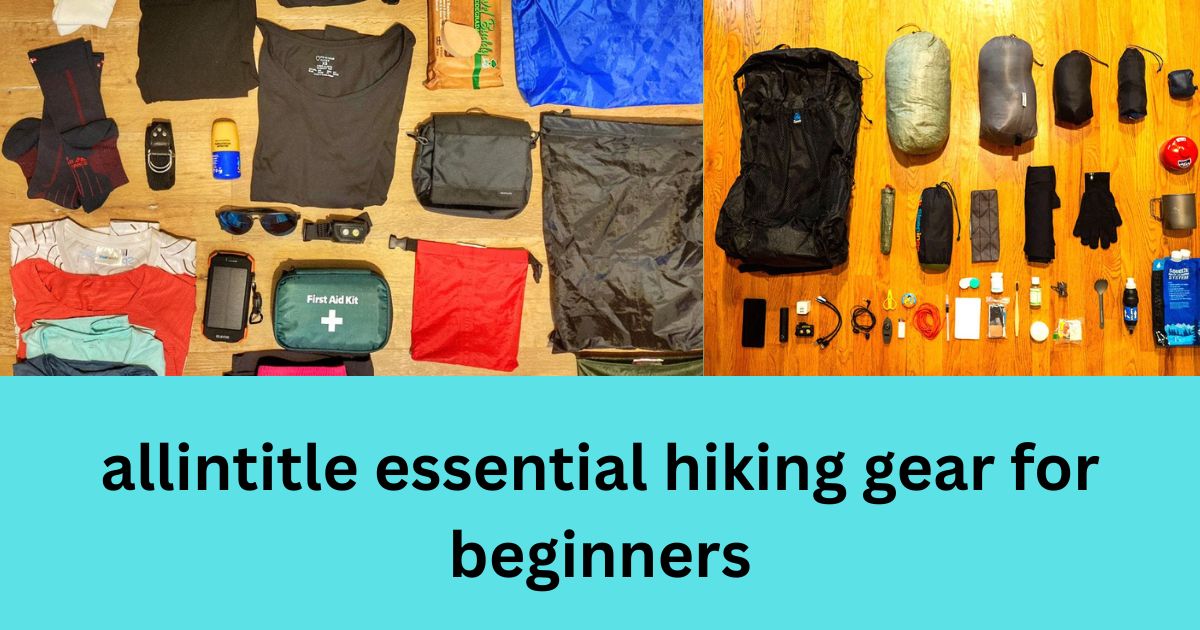Hiking is one of the most rewarding outdoor activities, offering an opportunity to reconnect with nature, improve physical fitness, and experience breathtaking landscapes. However, for beginners, heading out on a hiking trail without the right gear can lead to discomfort, safety issues, or even accidents. That’s why understanding essential hiking gear for beginners is crucial before you hit the trail.
In this comprehensive guide, we’ll cover everything you need to know about the must-have gear for a successful and safe hiking experience. From footwear and clothing to navigation tools and safety essentials, this article will help you prepare for your first adventure with confidence.
Why Having the Right Hiking Gear Matters
For beginners, hiking may seem as simple as walking on a trail, but it involves varying terrains, unpredictable weather conditions, and physical challenges. Proper gear ensures:
- Comfort – Reduces strain and prevents injuries.
- Safety – Helps you handle emergencies and adverse conditions.
- Convenience – Makes the overall hiking experience enjoyable.
According to Wikipedia’s Hiking page, hiking involves traveling long distances on foot, often on natural trails, which requires proper preparation to ensure safety and enjoyment.
Allintitle Essential Hiking Gear for Beginners: The Complete List
When you search for “allintitle essential hiking gear for beginners,” you are essentially looking for the most important items that every beginner should carry. Let’s dive into the details.
1. Proper Hiking Footwear
Footwear is arguably the most critical piece of hiking gear. Beginners often underestimate the importance of good shoes and end up with blisters, sore feet, or sprains.
- Hiking Boots – Provide ankle support and are ideal for rough terrains.
- Trail Shoes – Lightweight and comfortable for easy or moderate trails.
- Socks – Use moisture-wicking socks to prevent blisters.
Pro Tip: Avoid cotton socks; instead, choose merino wool or synthetic blends.
2. Backpack: Your Hiking Companion
A good-quality backpack ensures you can carry all your essentials comfortably. For beginners, a 20–30-liter daypack is ideal for short hikes.
Features to Look For:
- Padded shoulder straps
- Ventilated back panel
- Water bottle holders
- Multiple compartments
3. Navigation Tools
Getting lost on a trail is more common than you think. While smartphones are helpful, they can lose signal or battery. Always carry:
- Physical Map and Compass – A classic but reliable combination.
- GPS Device – Helpful for long or unfamiliar trails.
- Trail Guidebook or App – Download offline maps before starting.
Refer to Wikipedia’s article on Orienteering to learn more about navigation techniques.
4. Hydration Essentials
Dehydration can quickly ruin a hike and lead to serious health problems. Always carry enough water.
- Water Bottles – Simple and effective for short hikes.
- Hydration Bladder – Ideal for hands-free drinking during long hikes.
- Water Filtration System – A must-have for multi-day treks or areas without clean water sources.
Rule of Thumb: Carry at least 500 ml of water per hour of hiking.
5. Weather-Appropriate Clothing
Dressing in layers is key because weather conditions can change rapidly.
- Base Layer – Moisture-wicking fabric to keep sweat away.
- Insulating Layer – Fleece or lightweight down jacket for warmth.
- Outer Layer – Waterproof and windproof shell for protection.
Avoid cotton because it retains moisture and increases the risk of hypothermia.
6. Food and Snacks
Your body needs fuel to keep moving. Pack high-energy snacks like:
- Trail mix
- Energy bars
- Nuts and dried fruits
For longer hikes, consider lightweight meal options.
7. First Aid Kit
Accidents can happen, even on easy trails. A small but well-equipped first aid kit should include:
- Bandages and adhesive tape
- Antiseptic wipes
- Pain relievers
- Blister treatment
- Personal medications
8. Sun Protection
UV rays can harm your skin even on cloudy days. Carry:
- Sunscreen (SPF 30 or higher)
- Lip balm with SPF
- Sunglasses
- A wide-brimmed hat
9. Emergency Gear
For safety, especially on longer hikes, always pack:
- Whistle – To signal for help.
- Firestarter – Waterproof matches or lighter.
- Emergency Blanket – Lightweight and life-saving in cold conditions.
- Multi-tool or Knife – Useful for various tasks.
10. Trekking Poles
Although optional, trekking poles can reduce stress on your knees and provide better stability on uneven terrain.
How to Choose the Right Gear
When selecting hiking gear as a beginner, keep these points in mind:
- Quality Over Quantity – Invest in durable, reliable gear.
- Lightweight Options – Avoid heavy packs that can tire you quickly.
- Fit and Comfort – Test gear like shoes and backpacks before buying.
Common Mistakes Beginners Make
- Wearing cotton clothing.
- Not carrying enough water.
- Overpacking unnecessary items.
- Ignoring weather forecasts.
- Forgetting a first aid kit.
Essential Hiking Gear Checklist for Beginners
Here’s a quick summary of what you should pack:
✔ Hiking shoes or boots
✔ Backpack
✔ Map, compass, or GPS
✔ Water and filtration system
✔ Layered clothing
✔ Snacks and meals
✔ First aid kit
✔ Sun protection
✔ Emergency gear
✔ Trekking poles (optional)
Final Thoughts
Hiking is an incredible way to connect with nature, relieve stress, and stay fit. However, for beginners, preparation is the key to a safe and enjoyable experience. By following this allintitle essential hiking gear for beginners guide, you’ll be ready to tackle any beginner-friendly trail with confidence.
Always remember: Plan ahead, pack smart, and respect nature. For more details on hiking and outdoor activities, you can visit Wikipedia’s Hiking page.







